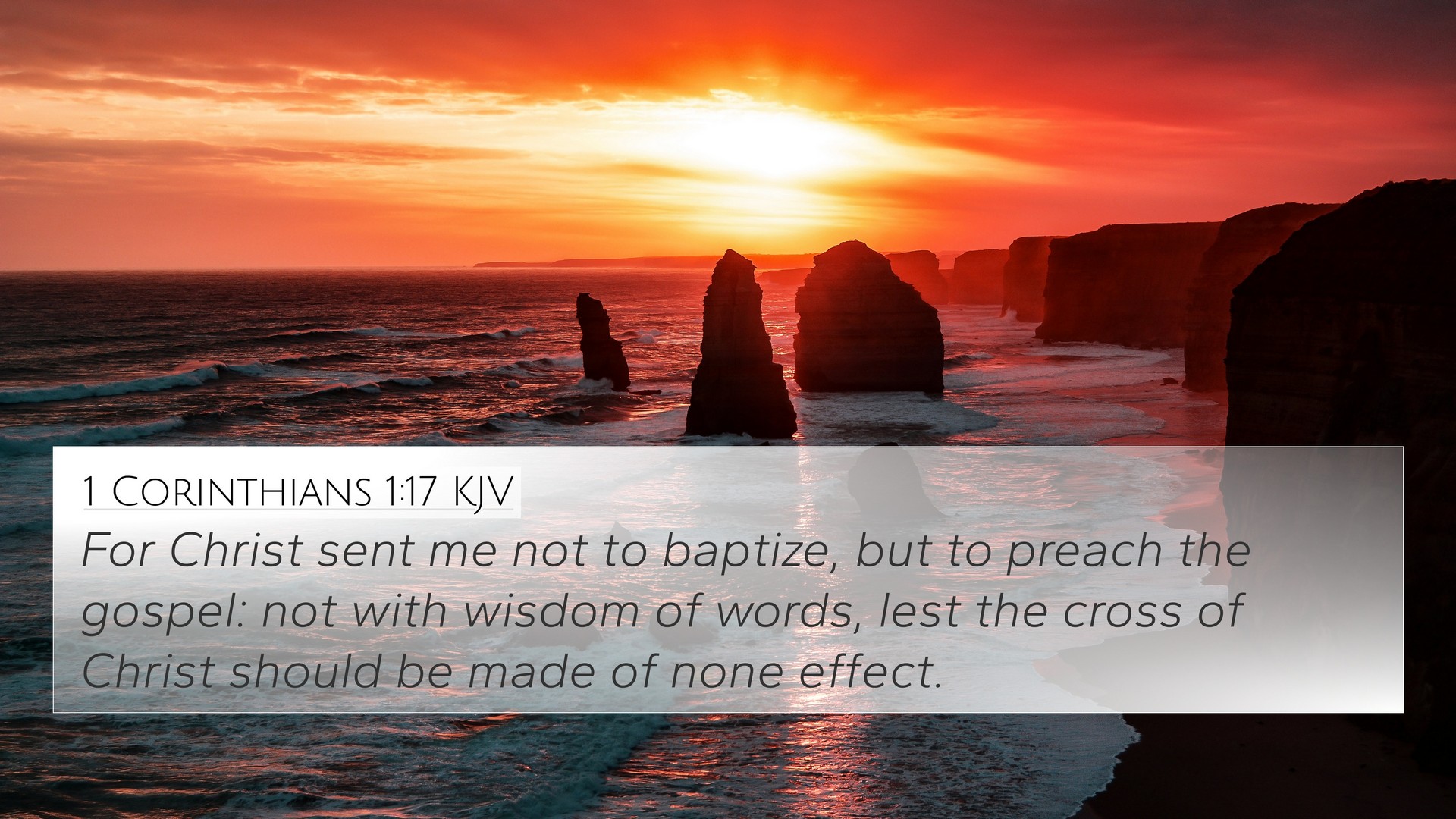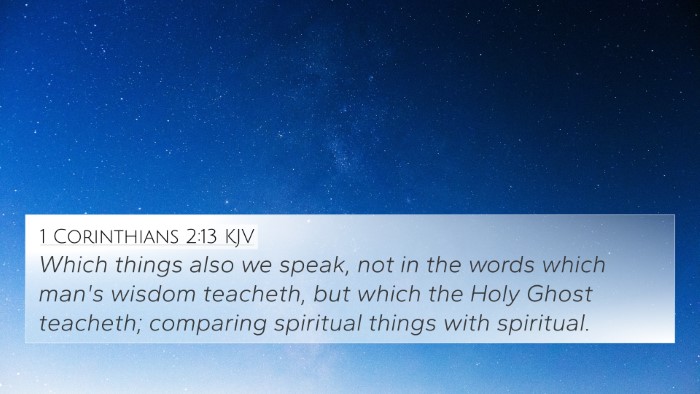Understanding 1 Corinthians 1:17
Bible Verse: 1 Corinthians 1:17 (KJV) - "For Christ sent me not to baptize, but to preach the gospel: not with wisdom of words, lest the cross of Christ should be made of none effect."
This verse is pivotal in understanding the Apostle Paul's mission and the core message of the Christian faith. Below is a comprehensive analysis drawing from several public domain commentaries, including insights from Matthew Henry, Albert Barnes, and Adam Clarke.
Verse Meaning and Interpretation
The primary focus of this verse is the distinction between baptism and the proclamation of the Gospel. Paul clarifies that while baptism is a significant act of faith, his divine commission was primarily to preach the Gospel.
- Mission of the Apostle: Paul emphasizes that Christ did not send him to perform baptism, which indicates that the act of baptism, while essential, is not the heart of the Gospel message. This distinction aligns with the broader theme of salvation through faith in Christ alone.
- The Preaching of the Gospel: The emphasis on preaching reflects the urgency of spreading the message of Christ. Paul’s mission was rooted in the proclamation that Jesus is the Savior, rather than in rituals.
- Wisdom of Words: The mention of "wisdom of words" suggests that eloquent speech should not overshadow the simplicity of the Gospel. Paul warns against rhetoric that might dilute the power of the message. Such wisdom could lead to focusing on human glory rather than divine grace.
- Effectiveness of the Cross: The ultimate concern of Paul is that the cross of Christ should not be made ineffective. His preaching must directly point to the cross, where salvation is fulfilled, reflecting a potent theme throughout his epistles.
Key Themes and Concepts
This verse encapsulates several crucial themes of Christian theology:
- Distinction between Baptism and Gospel Proclamation: While baptism is a vital expression of faith, it is not the focal point of Christian life; rather, the focus must remain on the Gospel itself.
- Power of the Cross: The message of the cross remains central, highlighting Christ's atoning sacrifice as essential for salvation.
- Role of the Preacher: The task of the preacher is to convey the Gospel truth without the distraction of overly sophisticated language or human reasoning, thus preserving the Gospel's integrity.
- Salvation by Grace through Faith: The cross signifies God’s grace, which must be the foundation of the Christian faith. Paul’s mission was to make this grace known.
Bible Cross-References
1 Corinthians 1:17 connects with several other passages that further elaborate on its themes:
- Matthew 28:19-20: The Great Commission emphasizes preaching and baptizing, demonstrating both aspects of the Christian mission.
- Romans 1:16: Paul states that the power of God for salvation lies in the Gospel, underscoring his commitment to preach it above all.
- Galatians 1:11-12: Paul asserts that the Gospel he preaches is revelation from God, affirming his role as a true messenger.
- 1 Corinthians 2:1-5: Paul contrasts eloquence with simplicity, reiterating his approach to preaching the Gospel.
- Colossians 2:8: The warning against human philosophy corresponds with Paul’s emphasis on the purity of the Gospel message.
- John 3:30: John the Baptist's declaration, "He must increase, but I must decrease," aligns with the humility Paul advocates in preaching the Gospel.
- Acts 4:12: Salvation through Jesus Christ alone links back to the necessity of proclaiming the Gospel's message clearly.
- Romans 10:14-15: These verses discuss the necessity of preaching for faith, reinforcing the critical role of proclamation.
- 1 Peter 1:23-25: The enduring nature of the Word of God mirrors the centrality of the Gospel that Paul preaches.
- 1 Corinthians 15:1-4: Paul provides a succinct summary of the Gospel's essentials, highlighting that Christ died for our sins, was buried, and rose again.
Theological Implications
1 Corinthians 1:17 invites deeper exploration into several important theological implications:
- Centrality of the Gospel: The proclamation of the Gospel must remain at the forefront of the church’s mission.
- The Nature of Conversion: The role of faith versus works (like baptism) in salvation is highlighted, emphasizing grace as the true means of salvation.
- Preaching as a Divine Commission: The call to preach serves as a reminder that evangelism is a foundational aspect of the Christian faith.
Cross-Referencing Biblical Texts
For those studying the Bible, understanding intertextual connections is invaluable. Below are some tools and strategies for effective cross-referencing:
- Bible Concordance: Utilize a concordance to find specific key terms and their occurrences throughout the Scriptures.
- Bible Cross-Reference Guide: Use guides that offer thematic connections and parallels between verses for deeper study.
- Online Bible Study Tools: Leverage digital platforms that offer cross-referencing features for enhanced understanding of biblical themes.
- Study Bibles: Many study Bibles provide annotations that link verses conceptually and contextually, aiding in comprehensive analysis.
- Topical Studies: Engage in studies focused on particular topics that facilitate comparative analysis across the Biblical narrative.
Conclusion
1 Corinthians 1:17 serves as a profound reminder of the essence of Christian ministry: the proclamation of the Gospel. Through Paul's insights, believers are encouraged to maintain focus on the message of salvation through Christ crucified, ensuring that the power of the cross is not diluted by human wisdom. As believers delve into scripture, the thematic connections and cross-references enhance their understanding, leading to a deeper faith and commitment to sharing the Gospel message.













